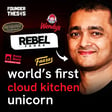
How to build a profitable bootstrapped D2C | Arush Chopra @ Just Herbs
It is rare for D2C startups to be bootstrapped because they need to burn cash to acquire customers initially. But the Just Herbs story is proof that there are clever growth hacks that can help you grow your D2C brand while remaining bootstrapped.
Arush Chopra was an aspiring actor who stumbled into a role in private equity which led to the start of his journey in the world of startups. He started Just Herbs with his wife and mother in 2014 out of his family home in Chandigarh. Today, Just Herbs outsells brands like Maybelline and Lakme in the lipsticks category and counts Marico as its primary backer.
This conversation is a gem for D2C founders and Arush shares some amazing insights around product channel fit, co-building with customers and running a profitable D2C startup.
Stay tuned for tons of insights and subscribe to the founder thesis podcast on any audio streaming app



















